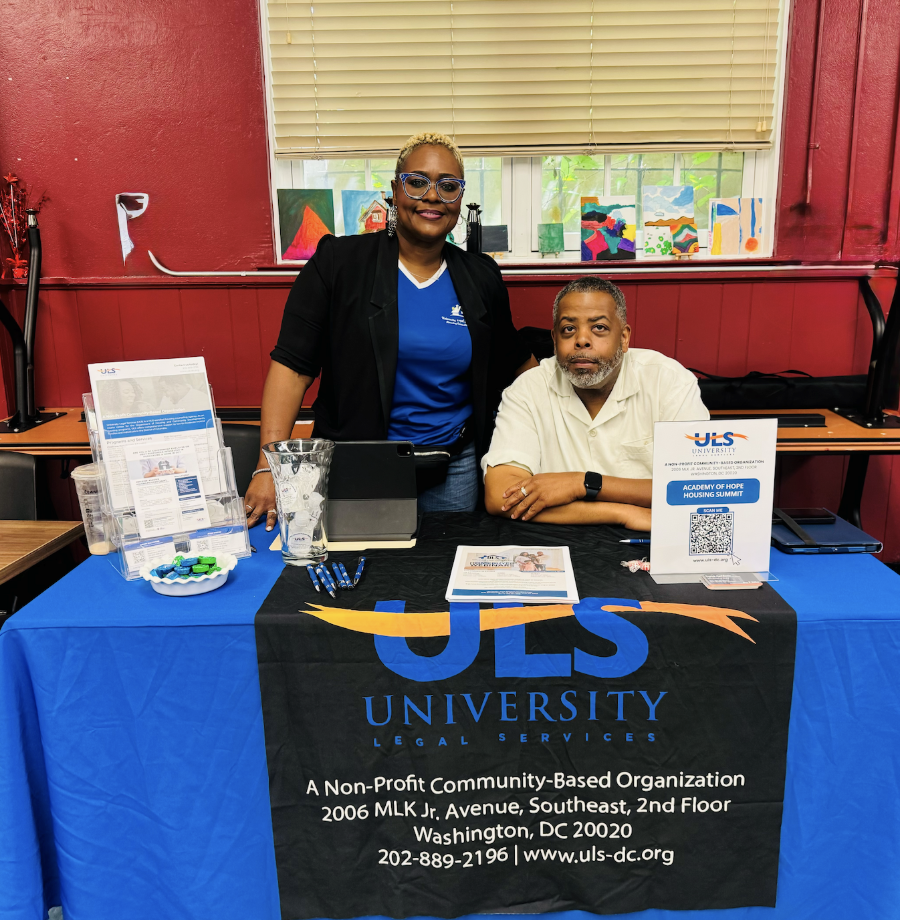Celebrating Nonprofit Day
National Nonprofit Day may have been last week, but our advocacy work goes on year-round! Our final spotlight newsletter is highlighting the work of our last two programs, Disability Rights DC and the Jail and Prison Advocacy Project.
Continue reading to learn more about our on-the-ground advocacy work. Please consider contributing to our mission. Your donation directly supports our efforts to strengthen our DC community.
The Jail and Prison Advocacy Project
The Jail and Prison Advovacy Project (JPAP) works with DC residnets diagnosed with psychiatric disabilities who are returning to the community after time in jail or prison. Many of our clients face housing insecurity, and some are unhoused. The recent Executive Order and federal takeover of DC police department is a threat both to our work and the lives of our clients.
Just as important metrics have improved— with crime rates dropping over the past 2 years, drops in juvenile arrests for violent crime—the pieces that helped fuel the progress are at risk. On August 11, Trump ordered 800 National Guard soldiers to crack down on crime and clear encampments of unhoused people. He also vowed to end cashless bail, which DC implemented in 1992, and charge kids as young as 14 as adults.
At the same time, there have been massive cuts to the basic support programs that make reentry successful, such as disability benefits, SNAP, Medicaid, and housing vouchers.
The data is clear: DC’s crime rates are falling, bail reform works, and public safety comes from increased and sustained investment in housing, physical and mental health, food support, and the risk factors that can lead to arrest. The Trump administration’s plans will undermine -not improve- public safety, and they contradict the science that has been driving such legislative changes as IRAA.
How JPAP is Helping Clients During the Federal Takeover
In the last week, according to the White House, 44 encampments have been removed around DC. This includes all tents that were on federal property, and federal teams reported "no negative confrontations" and no arrests. Earth movers have been brought in to scoop away tents and belongings, which is a safety risk. In 2021, a man was still inside his tent when it was picked up by a tractor. He had to be hospitalized, and the District changed its policy for clearing tents.
According to NPR, experts say that between 800-900 people sleep on Washington's streets each night in the summer. Many people do not feel comfortable staying in shelters for a variety of reasons, and forcing them out of their tents is not a long-term solution. Dana White of Miriam's Kitchen said that shelter capacity in the city can also be "very limited."
"We're simply moving the problem around, we're not really providing a solution to folks homelessness," Dana White told NPR. "D.C. shelter capacity is often very limited. Ultimately these people often have no permanent, stable place to go."
But White House officials have made it clear that those living on the streets must leave D.C. or find their way into shelters immediately. According to White House spokeswoman Karoline Leavitt, those who don't do so will face punishment in the form of fines and jail time.
JPAP has paid to place two of our clients in hotel rooms to avoid getting further displaced. While this is a temporary relief from the threats of jail time, it is not a permanent solution. Though the White House has been clear that they want to remove unhoused people from the capitol, they have not addressed the longer-term goal of what steps they are taking to reduce homelessness.
District officials say they are making more beds available in shelters, but it is largely unclear what else they are doing to provide stable housing options. Ending homelessness in DC requires more than temporary fixes or relocation—it requires a long-term investment in permanent housing and compassion for our neighbors, Policies that prioritize displacement over housing do not solve the problem, they only make it worse. Real solutions focus on helping ALL of our community members live with dignity and security, creating pathways for them to thrive, not just survive.
Disability Rights DC
Update on P&A Funding
The Senate Appropriations Committee has level-funded Protection & Advocacy programs. This means that the Senate has approved P&As like Disability Rights DC (DRDC) to receive the same amount of funding as the 2025 Fiscal Year. While this is a step forward compared to the drastic budget cuts that the President wanted in his budget proposal, it doesn't cover the growing demand for our services.
While this was a success in the Senate, we are not out of the woods yet. This is just one step of the budget process, and next it is being moved forward to the House. Several of our key programs are at risk of being defunded, according to a draft of the President's budget.
These threatened programs include:
- Protection and Advocacy for Individual Rights (PAIR)
- Protection and Advocacy for Individuals with Mental Illness (PAIMI)
- Protection and Advocacy in Accessible Voting (PAVA)
Reach out to your representatives and tell them to protect disability advocacy programs like DRDC. The Protection & Advocacy network saves lives, saves money, and strengthens our communities. Hands off disability services!
U.S. District Court’s Decision on Brown v. DC
DRDC celebrates the U.S. District Court’s decision on Friday which denied the District of Columbia’s Motion to Alter or Amend the December 31, 2024 decision in Brown v. DC.
The December 2024 decision held that DC has violated the rights of DC residents with disabilities under the Americans with Disabilities Act by failing to provide the transition assistance Medicaid beneficiaries in nursing homes need to move back to the community.
The Court’s decision sends a clear message that the District must address needless institutionalization and segregation of DC residents with disabilities. DRDC has represented the plaintiffs in this case for 14 years, along with AARP Foundation Litigation and the law firm, Terris, Pravlik & Millian. Read the full finding here.
DRDC and the Ward 8 Special Election
Last month, Ward 8 held a special election to fill their seat on the DC City Council. DRDC staff visited 12 of the 13 voting centers to validate their accessibility, doing our best to make sure that voting is accessible to all DC residents with disabilities.
Our surveyors were able to make on the spot recommendations to improve accessibility at some centers, which were implemented by the vote center staff. We are proud to work with vote centers in the District to ensure they are fully accessible to people with a range of disabilities, and that voters with disabilities can vote independently and privately.
DRDC does its voting work under our Protection and Advocacy for Voter Access (PAVA) grant. We visit voting sites during all local and federal elections, and our work helps to make the voting process easier for all residents. We could not do this work without our PAVA grant, so please be sure to reach out to your representatives to protect our funding.
.png)





